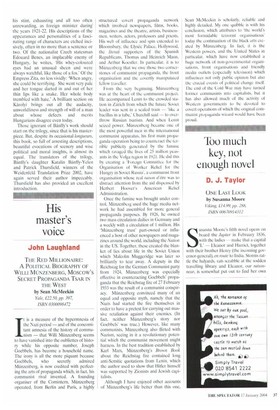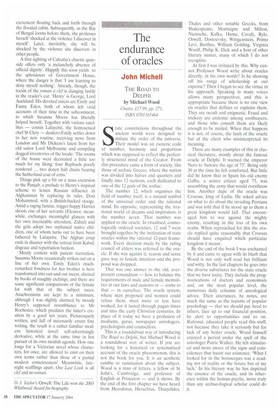Too much key, not enough novel
D. J. Taylor
ONE LAST LOOK by Susanna Moore Viking, £14.99, pp. 288, ISBN 00670914312 Susanna Moore's fifth novel opens on board the Jupiter in February 1836, with the ladies — make that a capital — Eleanor and Harriet, together with their brother Henry (the incoming governor-general), en route to India. Storms rattle the halyards, rats scrabble at the sodden travelling library and Eleanor, our raisonneur, is somewhat put out to find her own
excrement floating back and forth through the flooded cabin. Subsequently, as the Bay of Bengal looms before them, she professes herself 'shocked at the violence I discover in myself. Later, inevitably, she will be shocked by the violence she discovers in other people.
A first sighting of Calcutta's chaotic quayside offers only 'a melancholy absence of official dignity'. Happily this soon yields to the splendours of Government House, where the danger is that 'I am learning to deny myself nothing'. Already, though, the tocsin of the roman a clef is clanging lustily in the reader's ear. 'Henry' is George, Lord Auckland. His devoted sisters are Emily and Fanny Eden, both of whom left vivid accounts of their time in the subcontinent, to which Susanna Moore has liberally helped herself. Together with various satellites — cousin Lafayette, the homosexual chef St Clery — deutero-Emily settles down to her new routine, receiving news from London and Mr Dickens's latest from her old suitor Lord Melbourne and compiling dogged inventories of the locale: 'The rooms of the house were decorated a little too much for my liking: four Raphaels poorly rendered ... two dozen hall chairs bearing the Sutherland coat of arms.'
Things pick up a bit on a mass excursion to the Punjab. a prelude to Henry's inspired scheme to lessen Russian influence in Afghanistan by replacing its ruler, Dost Mohammed, with a British-backed stooge. Amid a raging famine, trigger-happy Harriet shoots one of her servants (Eleanor, meanwhile, exchanges meaningful glances with her own inscrutable attendant, Zahid) and the girls adopt two orphaned native children, one of whom turns out to have been fathered by Lafayette. The Afghan coup ends in disaster with the retreat from Kabul; disgrace and repatriation beckon.
Mostly content with patient recreation, Susanna Moore occasionally strikes out on a line of her own. Emily Eden's muchremarked fondness for her brother is here transformed into out-and-out incest, abetted by books of naughty etchings, and there are some significant comparisons of the female lot with that of the subject races. Anachronisms are kept to a minimum, although I was slightly alarmed by moody Henry's supposed resemblance to Mr Rochester, which predates the latter's creation by a good ten years. Picturesquely written, and full of necessarily ersatz fine writing, the result is a rather familiar modern historical novel: self-advertisingly derivative, while at the same time in hot pursuit of its own modish agenda. How one longs for a Victorian novel whose characters, for once, are allowed to exist on their own terms rather than those of a partial modern consciousness! Meanwhile, latenight scufflings apart, One Last Look is all clef and no roman.



































































 Previous page
Previous page